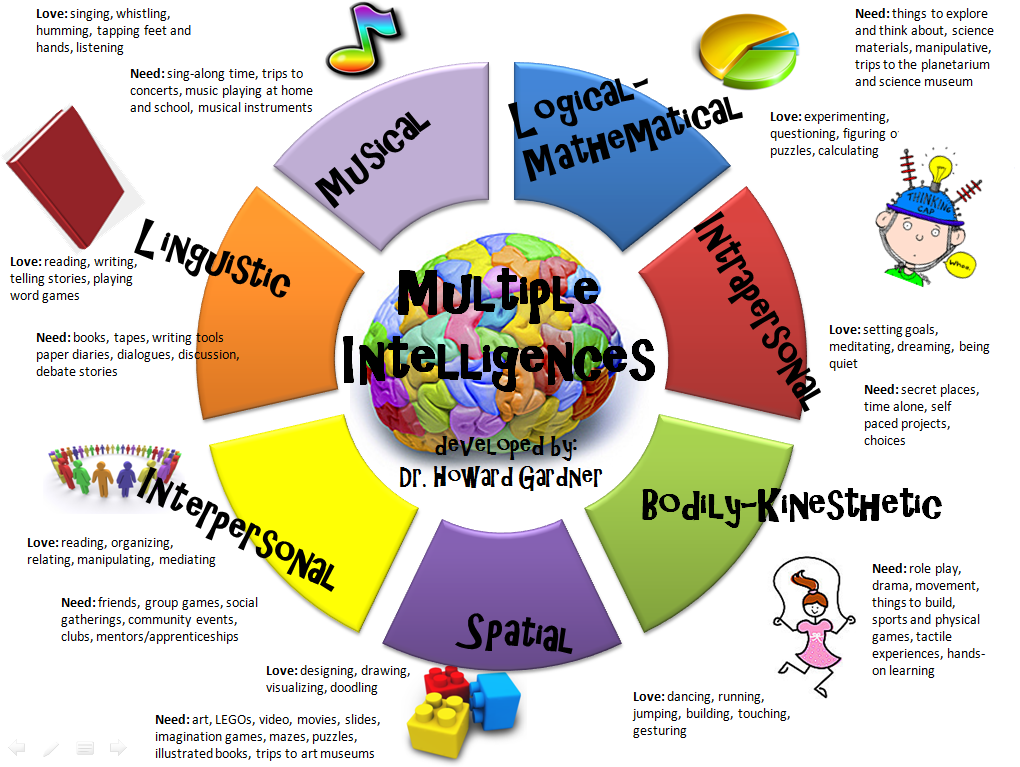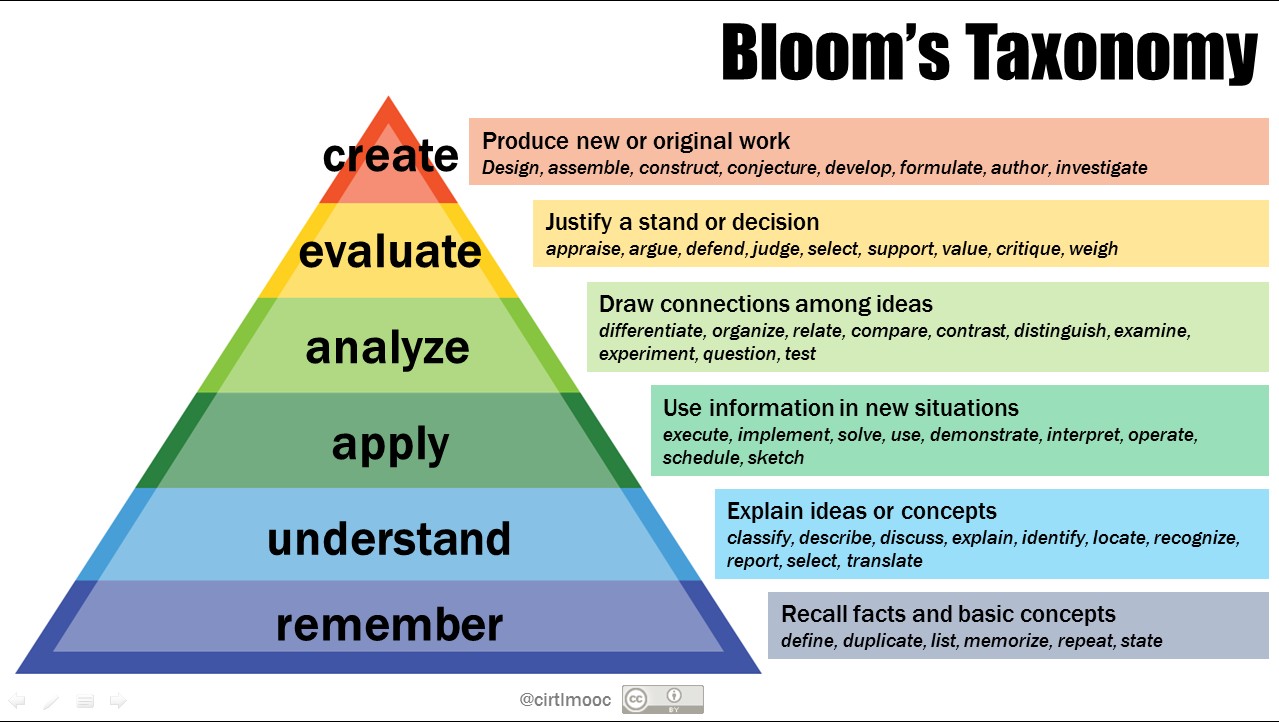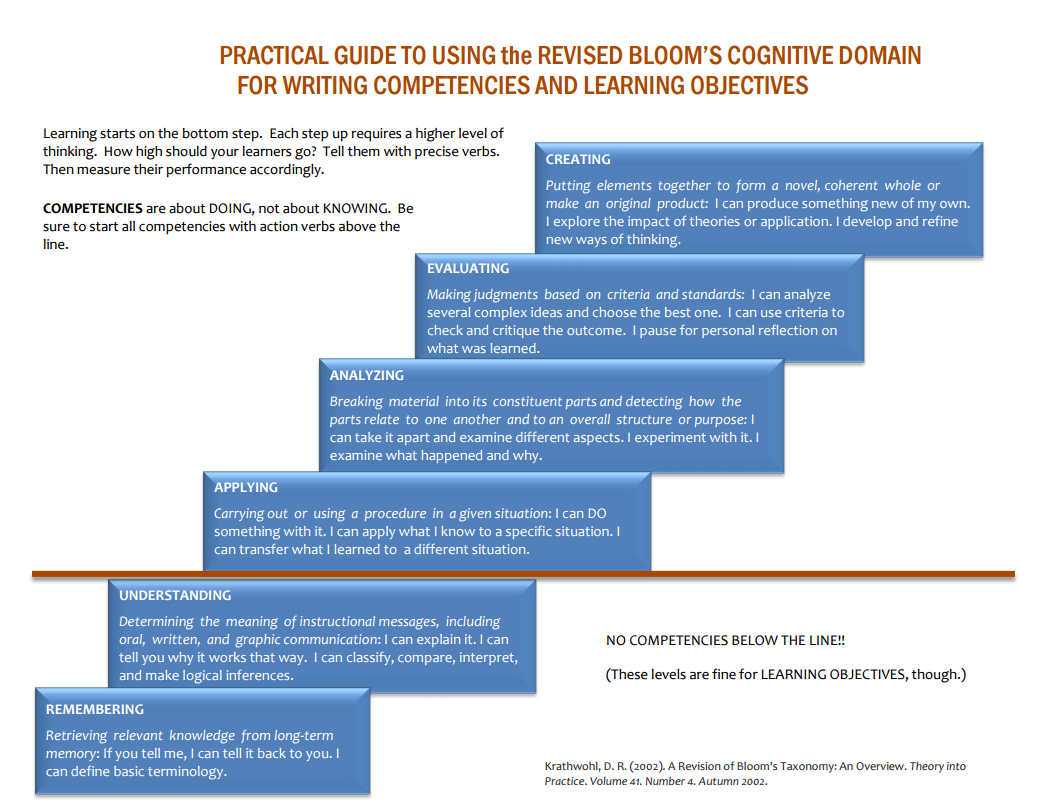Home / Philosophy / Alpha and Omega
Bloomin' Onions
- Assignments
- Bloom's Taxonomy: Levels of Intelligence
- Gardner's Eight Intelligences
- Loci of Intelligence
Assignments
Take a survey test to help determine your Intelligences.
- We gauge others by their behaviours and words, and we gauge ourselves by our intentions and thoughts.
- 1st, you take the test.
- 2nd, have a friend or close loved one take it as if they are you; that is, they should answer each question how they think YOU would answer it.
- 3rd, have one more take the survey test, answering as they think you would answer.
- Take the survey test
- Keep in mind this is not astrology.
- The survey is not meant to validate you; it's meant to show your failings.
- The aim of this survey is determine which of your intelligences needs strengthening.
- The intelligences at the lower end of the results is what you must work on to improve your ability to think.

Bloom's Taxonomy


Gardener's Multiple Intelligences

Description of Each Intelligence
- Linguistic
People with strong linguistic skills can use their native language, and sometimes other languages, to understand people and express their thoughts. Examples of professionals with above average intelligence levels in this area include writers and orators.
- Logical-mathematical
Scientists are examples of people strong in the logical-mathematical intelligence because they can manipulate numbers the way mathematicians do. They tend to have above average logical-mathematical skills also because of their knowledge of causal systems.
- Visual/Spatial
Spatial intelligence involves the skills people have to represent the spatial world, especially intheir mind's eye. Spatially intelligent people tend to become painters, sculptors, and architects. Spatial intelligence is used more often in certain sciences like anatomy and topology.
- Bodily-kinesthetic
This intelligence relates to the ability to use whole or certain body parts to create something, solve a problem, or display skills involving bodily movement at an event. Examples of professionals strong in this intelligence include athletes and dancers.
- Musical
People with enhanced musical intelligence have a heightened ability to hear, recognize, and remember patterns. They think in music and cannot get it out of their minds. In Frames of Mind, Gardner indicated that musical intelligence emerges earlier than other intelligences.
- Interpersonal
The interpersonal intelligence involves one’s ability to understand others. People strong in this intelligence can detect other people’s moods, intentions, and desires. This intelligence is especially important for individuals who deal frequently with people like teachers, clinicians, and salespeople.
- Intrapersonal
An enhanced understanding of oneself is a characteristic of someone strong in the intrapersonal intelligence. A developed intrapersonal intelligence enables people to anticipate how they would react to experiences and how to choose the experiences that can be beneficial. It also helps people be aware of the diffi- culties they might encounter.
- Naturalist
The naturalist intelligence was added to the original seven. It relates to an individual’s ability to differentiate among living things. People strong in this intelligence are good at classifying plants, minerals, and animals as well as rocks and grass.
Argument against Gardner's Multiple Intelligences
- "Learning styles don’t exist: A teaching approach that is based on students’ preferences sounds laudable. But this misunderstands how learning happens" (article)
"There has been an ‘utter failure to find that assessing children’s learning styles and matching to instructional methods has any effect on their learning’. And yet, the numbers of educators who still believe in learning styles as an appropriate teaching method makes for a depressing picture. Among some advocates, there is an almost cultish devotion, with one researcher interviewing a teacher who claimed that ‘even if the research says it doesn’t work, it works.’ This statement is a damning one for a profession in which so much is at stake, and it is emblematic of a wider malaise in education, which is still hugely prone to faddism and pedagogical snake oil."
Body, mood, motivation, and disposition
Body
- The Yogi masters were right – breathing exercises can sharpen your mind (article)
"The research shows for the first time that breathing – a key element of meditation and mindfulness practices – directly affects the levels of a natural chemical messenger in the brain called noradrenaline. This chemical messenger is released when we are challenged, curious, exercised, focused or emotionally aroused, and, if produced at the right levels, helps the brain grow new connections"
- First step: Diaphragmatic breathing
Mood (aka, Attitude)
- How to foster Shoshin (article)
"In one pertinent study in 2015, researchers at Yale University asked graduates to estimate their knowledge of various topics relevant to their degrees, and then tested their actual ability to explain those topics. The participants frequently overestimated their level of understanding, apparently mistaking the ‘peak knowledge’ they had at the time they studied at university for their considerably more modest current knowledge."
- Expecting a stressful day may lower cognitive abilities throughout the day (article)
- Psychologists find a mindset that can foster positive feelings amid interpersonal conflict (article)
- Embodied cognition is not what you think it is (article)
Motivation
"The research shows for the first time that breathing – a key element of meditation and mindfulness practices – directly affects the levels of a natural chemical messenger in the brain called noradrenaline. This chemical messenger is released when we are challenged, curious, exercised, focused or emotionally aroused, and, if produced at the right levels, helps the brain grow new connections"
Mood (aka, Attitude)
"In one pertinent study in 2015, researchers at Yale University asked graduates to estimate their knowledge of various topics relevant to their degrees, and then tested their actual ability to explain those topics. The participants frequently overestimated their level of understanding, apparently mistaking the ‘peak knowledge’ they had at the time they studied at university for their considerably more modest current knowledge."
Motivation
When considering the lists below, think about who gains from having a world based on performance and who gains from a world based on mastery
| Performance | Mastery | |
| Reason to put forth effort | Obtain high scores/grades/accolades/awards | Learn to explore and understand something new; develop one’s sense of self, one’s self-efficacy, one’s total skill set |
| focus of attention on effort | One’s own performance relative to others’ abilities: Negative "motivation", Shame, insecurity, identity, ego | Stages: Initiate, Awkward, Conscious-use, Naturalized-use (Go here for the explanation of the stages of learning |
| Reasons for satisfaction | Publicly praised | working hard, overcoming challenges, figuring out complexity |
| teacher oriented toward | how students perform to a metric | how students learn: cognitively, psychically, and physically |
| error/mistake viewed as | a source of anxiety | part of learning |
| focus of attention | own performance relative to others | process of learning |
| Reason to put forth effort | Obtain high scores/grades | Learn/understand something new |
| How learners are evaluated | normative, relative to others | individual progress improvement |
Disposition (one's usual mindset and emotional state)
Know no know
- Stop using the word "know"
- When you ask if someone "knows something," you inadvertently are asking about their level of their intelligence.
- Instead, ask someone if they've "heard" of something.
- If they have heard of that thing, you can ask what they've heard.
- If not, they won't feel lessened by your question.
Fuhgeddaboudit
- Neuroscience and a Dose of Emotional Intelligence Reveal a Simple Trick to Learn More With Less Effort (article)
Forgetting is an integral part of learning. Relearning reinforces earlier memories. Relearning creates different context and connections.
- Neuroscientists successfully test theory that forgetting is actually a form of learning
Forgetting is an integral part of learning. Relearning reinforces earlier memories. Relearning creates different context and connections.
- Proactive and Retroactive Interference: Definition and Examples
Retroactive interference happens when an individual is unable to recall old information because new information prevents its retrieval. In other words, new memories interfere with the retrieval of old memories.
Worldviews can limit cognition
- People with extremist views less able to do complex mental tasks, research suggests
"Participants who are prone to dogmatism – stuck in their ways and relatively resistant to credible evidence – actually have a problem with processing evidence even at a perceptual level"
- Collective Narcissism: Proud Groups & Nationalism make us toxic
Just like self-esteem (how you see your own worth), there is group-esteem (how you see your group’s worth). People who form the “collective narcissists” gain self-esteem from their group’s image and worth.
- Trump supporters use less cognitively complex language and more simplistic modes of thinking...
A text analysis of written narratives from United States citizens revealed that Trump supporters used language that was more positive, less cognitively complex, and suggested a simplistic and categorical way of thinking.
- New psychology research indicates that social rigidity is a key predictor of cognitive rigidity
In addition to the measures of cognitive and social rigidity, the researchers also included measures of bullshit receptivity and overclaiming. Bullshit receptivity was assessed using the Bullshit Receptivity Questionnaire, which asked participants to rate the meaningfulness and profundity of pseudo-profound statements.
Area Articles
- Is Philosophy Simply Harder than Science?
"The worth of philosophy lies in the process, not the product"
- Integrative complexity is a measure of the intellectual style . . .
Complexity has two components, differentiation and integration. Differentiation refers to the perception of different dimensions when considering an issue. Integration refers to the recognition of cognitive connections among differentiated dimensions or perspectives.
Know no know
- Stop using the word "know"
- When you ask if someone "knows something," you inadvertently are asking about their level of their intelligence.
- Instead, ask someone if they've "heard" of something.
- If they have heard of that thing, you can ask what they've heard.
- If not, they won't feel lessened by your question.
Fuhgeddaboudit
- Neuroscience and a Dose of Emotional Intelligence Reveal a Simple Trick to Learn More With Less Effort (article)
Forgetting is an integral part of learning. Relearning reinforces earlier memories. Relearning creates different context and connections.
- Neuroscientists successfully test theory that forgetting is actually a form of learning
Forgetting is an integral part of learning. Relearning reinforces earlier memories. Relearning creates different context and connections.
- Proactive and Retroactive Interference: Definition and Examples
Retroactive interference happens when an individual is unable to recall old information because new information prevents its retrieval. In other words, new memories interfere with the retrieval of old memories.
Worldviews can limit cognition
- People with extremist views less able to do complex mental tasks, research suggests
"Participants who are prone to dogmatism – stuck in their ways and relatively resistant to credible evidence – actually have a problem with processing evidence even at a perceptual level"
- Collective Narcissism: Proud Groups & Nationalism make us toxic
Just like self-esteem (how you see your own worth), there is group-esteem (how you see your group’s worth). People who form the “collective narcissists” gain self-esteem from their group’s image and worth.
- Trump supporters use less cognitively complex language and more simplistic modes of thinking...
A text analysis of written narratives from United States citizens revealed that Trump supporters used language that was more positive, less cognitively complex, and suggested a simplistic and categorical way of thinking.
- New psychology research indicates that social rigidity is a key predictor of cognitive rigidity
In addition to the measures of cognitive and social rigidity, the researchers also included measures of bullshit receptivity and overclaiming. Bullshit receptivity was assessed using the Bullshit Receptivity Questionnaire, which asked participants to rate the meaningfulness and profundity of pseudo-profound statements.
Area Articles
- Is Philosophy Simply Harder than Science?
"The worth of philosophy lies in the process, not the product"
- Integrative complexity is a measure of the intellectual style . . .
Complexity has two components, differentiation and integration. Differentiation refers to the perception of different dimensions when considering an issue. Integration refers to the recognition of cognitive connections among differentiated dimensions or perspectives.